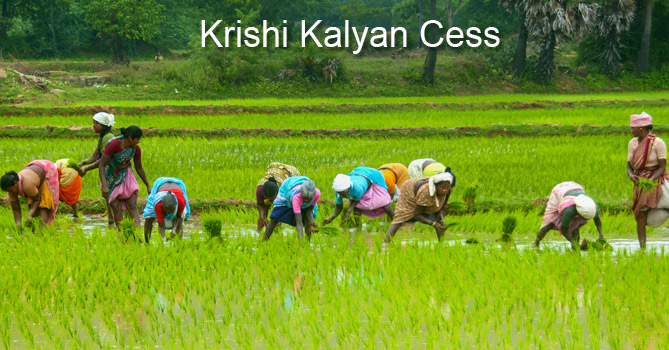The Krishi Kalyan Cess is a new cess introduced by the Union Finance Minister Arun Jaitley while presenting the budget for the ongoing fiscal, 2016-17. The new cess is supposed to be levied at a rate of 0.5% on all goods and services where the government can levy service taxes. This cess would be applicable above and over Swachh Bharat Cess and service tax. It will come into effect from 1st June 2016. It is supposed to promote various initiatives in the domain of agriculture and also finance them. The government already charges service taxes at the rate of 14% and the Swachh Bharat Cess is applied at a rate of 0.5%. With the KKC, the total service tax rate would effectively go up to 15%.
Areas where Krishi Kalyan Cess be applicable
As has been said already, the KKC will be applicable on goods and services where service taxes are collected by the central government. This includes, but is not restricted to, the following:
- telephone bills
- property under construction
- internet bills
- air travel agent
- payment of rents
- digital advertisements
- payment of restaurant bills
It needs to be noted in this context that the service provider who is collecting the tax will not have the luxury of just mentioning 15% in the service tax column. He will need to mention the entire breakup in the said bills.
How will KKC be applied for services before 1 June?
- Krishi Kalyan Cess will be applicable for all services that may have been provided before 1 June, but where the payment has been made on that date or afterwards.
- In cases where the service has been provided before the said date and the invoice has been raised before 1 June the cess will be applicable as well.
- In cases where service has been provided before 1 June and payment has been received before 1 June, but invoice has been raised at a later date, KKC will not be applicable.
- However, if invoice is not generated within 14 days of payment, KKC will be applied. Even in cases where part payments are made and part invoices are generated after 1 June, KKC will be applied.
Krishi Kalyan Cess Calculation
Krishi Kalyan Cess, which was announced during the 2016-17 Budget, has become applicable from 1 June. A tax of 0.5% would be levied over and above the Service Tax and Swachh Bharat Cess. Till 31 May 2016, the Service Tax rate was 14.5%. With Krishi Kalyan cess, the service tax would increase to 15%. While Swachh Bharat Cess was levied to conduct cleanliness drive in India, the new cess has been levied for the purpose of financing and promoting initiatives to improve agricultural growth.
Krishi Kalyan Cess Cenvat Credit Rules
The good news is that CENVAT Credit will be available. CENVAT (central value added tax) credit, whose rules will be revised according the change in service tax, will be available to service providers on the cess they are paying on input services.
Other important details
The money collected from the Krishi Kalyan Cess will initially be submitted to the Consolidated Fund of India and then it will be collected by the central government after the parliament has appropriated it in the proper method. The exemptions from tax, penalty, and interest, and refunds related to the KKC will be made as per the provisions and rules of the Chapter V of the Finance Act 1994. The input credit provided under the cess can be claimed against the cess as well.
Rounding up
This is a major development and a praiseworthy initiative by the Indian Government. If implemented properly it has the potential to be a major game changer for the farmers across India as now they will have access to a greater amount of money. With this additional money, farmers can buy better machinery, seeds, fertilizers, etc. and they may also be in a position to get better prices on their produce.
Read More:
Income Declaration Scheme 2016
Swachh Bharat Cess on Service Tax
Indirect tax evasion of Rs. 50,000 crore in two years
Indo-US Tax Information Exchange Agreement
Corporate Tax in India
What is GST: How will it change India
GST Bill Nears Consensus
Comparison of Goods and Services Tax Bill under UPA II and NDA
Tax Relief Bonanza
New tax to reduce beverage consumption in India
Tax filing for NRIs
New GST regime and its future impact on telecom industry in India
Income Tax Saving Tips




